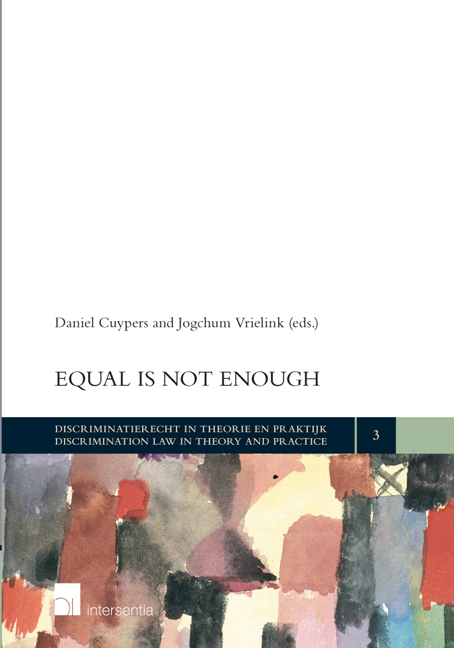Book contents
- Frontmatter
- Contents
- About the Authors
- Introduction
- The Importance of Equality Law and Human Rights in Addressing Socio-Economic Inequality
- Housing Rights and the Inclusion of Roma and Travellers. Towards Positive Action Measures from the Rulings of the European Court of Human Rights?
- The Right to Work of People with Disabilities. The Obligation to Accommodate as an Emanation of the Contemporary Approach to Disability
- Indirect Discrimination, Reasonable Accommodation and Religion
- Reconsidering Civic Integration Policies for Migrants through the Lens of Socio-Economic Status. Examples of Belgian and Dutch Legal Orders
- Does Equality Law Make a Difference? Social Science Research on the Effect of Discrimination Law on (Potential) Victims
- From a ‘Relative’ to a ‘Relational’ Equality: Rethinking Comparability in the Light of Relational Accounts of Social Justice
Introduction
Published online by Cambridge University Press: 21 September 2018
- Frontmatter
- Contents
- About the Authors
- Introduction
- The Importance of Equality Law and Human Rights in Addressing Socio-Economic Inequality
- Housing Rights and the Inclusion of Roma and Travellers. Towards Positive Action Measures from the Rulings of the European Court of Human Rights?
- The Right to Work of People with Disabilities. The Obligation to Accommodate as an Emanation of the Contemporary Approach to Disability
- Indirect Discrimination, Reasonable Accommodation and Religion
- Reconsidering Civic Integration Policies for Migrants through the Lens of Socio-Economic Status. Examples of Belgian and Dutch Legal Orders
- Does Equality Law Make a Difference? Social Science Research on the Effect of Discrimination Law on (Potential) Victims
- From a ‘Relative’ to a ‘Relational’ Equality: Rethinking Comparability in the Light of Relational Accounts of Social Justice
Summary
In February 2015 the University of Antwerp hosted the third Equal is not Enough conference. The conference was organised by the Flemish Policy Research Centre on Equality Policies (a consortium of the universities of Antwerp, Brussels, Ghent, Hasselt and Leuven).
The Equal is not Enough conferences have aimed, over the years, to generate a better understanding of what shapes and reshapes inequalities by inviting and promoting multi-disciplinary insights and reflection. In the third edition the conveners focused on the causes, consequences and the dynamics of inequality along socio-demographic lines in contemporary societies, and on policies to combat these inequalities.
One of the conference's sections focused on discrimination law. Discrimination law aims to lead, inter alia, to a more participatory society with respect for minority rights, and to a meritocratic labour market. The ethical and political aims of discrimination law are high, as is evidenced for instance by the relevant EU directives:
‘Employment and occupation are key elements in guaranteeing equal opportunities for all and contribute strongly to the full participation of citizens in economic, cultural and social life and to realizing their potential’ (consideration 9 FD 2000/78).
Discrimination law is, therefore, not (merely) an aim in itself; it is also considered instrumental to social policy and social justice.
The conveners (including the editors of this volume) welcomed papers on the relationship between social policy and discrimination law (or closely related human rights issues), which investigated the tensions and (in)compatibilities between the respective aims and tools of social policy and discrimination law. They were particularly interested in papers that transcend legal technicalities and reflect on the function of discrimination law as part of a wider social policy in the European Union and its member states. Likewise, multi- and interdisciplinary approaches were especially welcomed.
The call for papers, widely distributed in the summer of 2014, yielded 29 abstracts. Of those abstracts only 17 finally made it to the conference. The strict critical selection left substantial time for lively and academically satisfying discussion among participants and speakers, aft er the presentations in the workshops.
FROM CONFERENCE TO PROCEEDINGS
The authors of the best papers were asked to publish their text in the conference proceedings. The selection was made by the presidents of the workshops and the editors.
- Type
- Chapter
- Information
- Equal is not Enough , pp. 1 - 4Publisher: IntersentiaPrint publication year: 2016



